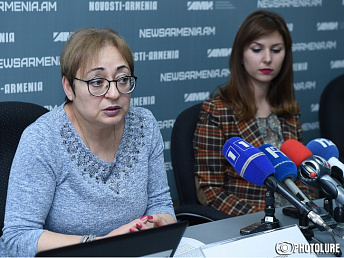These January days, Armenians around the world remember the victims of the Armenian pogroms in Baku, the capital of Azerbaijan, 29 years ago. For a whole week, from January 13 to 19, 1990, the Azerbaijani authorities organized and carried out mass pogroms of the Armenian population of the city. About a quarter of a million local Armenians were subjected to violence and deportation only because of their national identity, as a result there is no Armenian left in Baku now.
The immovable and movable property of thousands of Armenians was looted and taken away. According to estimates of various international organizations, about 500 Armenians became victims of the violence.
Speaking at a press conference convened today at Novosti Armenia news agency, an expert on the Karabakh issue, Marina Grigoryan recalled that so far not a single organization or government, including Armenia, has assessed these events as genocide.
‘I have hopes that next year, when the Armenian pogroms in Baku turn 30, the Armenian parliament will adopt a condemning statement,” Grigoryan said.
She also recalled that the pogroms of Armenians in Baku were preceded by pogroms in Sumgait in the spring of 1988, when it became clear that there would be no responsibility for what was done there. Officially, 27 Armenian were killed and hundreds were injured in Sumgait and 18 thousand Armenians of Sumgait had to flee the city. However, according to numerous facts and testimonies, the death toll in Sumgait is much higher -from 100 to 200 people.
Marina Grigoryan also spoke about the latest meeting of Armenian and Azerbaijani foreign ministers in Paris, saying the topic of pogroms of Armenians in Baku is related to it directly. “The co-chairs of the OSCE Minsk Group called on Armenian and Azerbaijani authorities to prepare their peoples for peace. I am sure of one thing: Azerbaijan must accept the historical reality, the numerous crimes committed against its Armenian population,” said Grigoryan. She noted that without the recognition there can be no talk of any reconciliation between the two nations.
Another expert Greta Avetisyan, recalled Ramil Safarov, an Azerbaijani officer who killed an Armenian officer Gurgen Margaryan in Budapest where both were having NATO-sponsored language course and who was glorified in his homeland. Safarov was sentenced to life imprisonment by a Hungarian court in 2004 but later was pardoned as a result of a deal between Baku and Budapest. She also recalled the beheading of three Armenian servicemen, the torture of helpless old men in Talish by Azerbaijani troops in April 2016 during the so-called ‘four-day war, after which the troops were glorified as heroes in Azerbaijan.
According to her, this is also a consequence of the impunity and indifference of the international community. She said it is necessary to inform the international community about these crimes, and take steps to achieve their condemnation.

